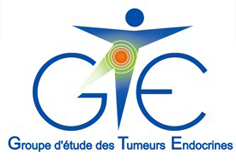BETTER-2
- Type d'étude :
- Phase II-R
- Promoteur :
- Gustave Roussy
- Etat actuel de l'étude :
- Terminée aux inclusions
Evaluer l’efficacité sur la survie sans progression de l’association capécitabine témozolomide et 5FU – streptozotocine, et de l’adjonction de bévacizumab à la chimiothérapie. Etude de phase II randomisée non comparative, plan factoriel.
RANDOMIZED PHASE 2 TRIAL OF TWO CHEMOTHERAPY REGIMENS PLUS OR MINUS BEVACIZUMAB IN PATIENTS WITH WELL DIFFERENTIATED PANCREATIC NEUROENDOCRINE TUMORS
BETTER-2
Gustave Roussy ; Investigateur principal
TNE pancréatique
Interventionnelle
Phase II randomisée 1:1
M Ducreux (Villejuif),  Mail Ducreux
Mail Ducreux
Lyon, Clichy, Villejuif, Dijon, Reims, Paris, Lille …..
Objectif principal : Compare the effect of capecitabine (cape) + temozolomide (temo) and of 5FU + streptozotozin (strepto) given with a new schedule (LV5FU2 + strepto), two of the most used chemotherapy regimens in the treatment of well differentiated pancreatic neuroendocrine tumors alone or in combination with bevacizumab (beva) on progression-free survival (PFS) and compare the chemotherapy regimens alone or with beva (two by two design) on the same criteria.
Objectifs secondaires :
Compare the tolerance (NCI-CTC) and other parameters of efficacy of two different schedules of chemotherapy, and the effect on tolerance and efficacy of the addition of beva to chemotherapy:
Other parmaters of efficacy will include: objective response and its duration, quality of life (EORTC QLQC 30), and overall survival
1. Well differentiated pancreatic neuroendocrine tumor grade 1 (NET G1) or grade 2 (NET G2): mitotic index < 20 and Ki67 index <20 %
2. Indication for chemotherapy for locally advanced or metastatic disease with proven progression (20% increase of tumor size on a 12 months period of follow-up) or other indication of chemotherapy following the TNCD (liver involvement > 50%, symptoms related to the tumour or its metastases, Ki67>10%)
3. Patient with at least one measurable target tumor by RECIST 1.1 and who have never been irradiated
4. Patient with a life expectancy greater than 3 months
5. Men or women with performance status (ECOG) < 2 and age > 18 years
6. Adequate hematological function: neutrophil count (ANC) > 2×109/L, platelets > 75×109/L, hemoglobin > 10g/dl.
7. Adequate liver function: serum bilirubin < 3 x upper limit of normal (ULN); aminotransferases and alkaline phosphatase levels < 2.5 ULN (< 5 ULN if liver metastases), TP > 50%
8. Absence of proteinuria greater than 1g/24 h, blood creatinine less than 120 µmol/L and creatinin clearance > 60 ml/min as calculated by Cockroft-Gault formula
9. Absence of active bleeding
10. Prior treatment with somatostatin analogues, everolimus or sunitinib is allowed
11. Informed consent signed by the patient or his/her legal representative.
12. Patient affiliated to a social security regimen or beneficiary of such regimen
1. Disease accessible to resection or percutaneous method of destruction
2. Contraindication to fluoropyrimidines, as mentioned in the SMPC of investigational medicinal products; known dihydropyrimidine deshydrogenase (DPD) deficiency.
3. Patient previously treated with chemotherapy for the neuroendocrine tumour
4. Patient under treatment with any other antitumor therapy
5. History of cancer (except basal cell skin or carcinoma in situ carcinoma of the cervix) within 5 years prior to entry into the trial. And cancers that have been treated more than 5 years ago and are considered as cured.
6. Other serious diseases such as respiratory failure or congestive heart failure, angina pectoris not medically controlled. History of myocardial infarction within 6 months prior to study entry, uncontrolled hypertension and arrhythmias. Concomitant severe infection.
7. Neurological or psychiatric pathology that may interfere with adherence to treatment
8. Patients deprived of liberty or under guardianship,
9. Patients unable to undergo medical monitoring test for geographical, social reasons.
